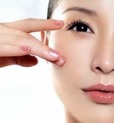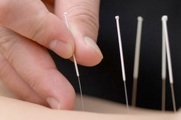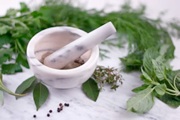



How it works
The human body is kept alive and functioning by a vital energy called Qi. When this force is weakened, the body isn’t able to resist disease. An imbalance will appear in the pathways (meridians) through which the Qi flows. These are the treatment points used in acupuncture.
Each point provides a specific body function that regulated the free flow of vital energy for health and well being. Acupuncture accesses the source of life itself. The acupuncturist uses pre-sterilized, disposable needles to open or close specific points along the meridians.
Diseases are prevented or treated by stimulating or reducing the Qi life force through specific points. Then, the Qi flow is strengthened or sedated, monitored, and balanced to achieve the desired result.
With a skilled acupuncturist, you will feel a slight pressure or no pain after needle insertion. Some patients experience a heavy sensation or numbness. These very fine and flexible needles are lightly inserted and reach the meridian points to attract or disperse energy.
Other techniques
For patients who are worried about needles, the acupuncturist can treat problems by using other Oriental medicine techniques:
-
• Moxibustion – applying slowly burning moxa-wool heat to acupuncture body points.
-
• Acupressure – finger technique Tui-Na (Chinese massage)
-
• Cupping technique
-
• Electro-stimulation with a modern electrical device
-
• Laser and sono-puncture infrared
-
• Magnetic devices
-
• Dietary advice based on Traditional Chinese Medicine theory
-
• Chinese herb prescriptions

What is Chinese Herbal Medicine?
Herbal medicine is a major component of traditional Oriental medicine, a comprehensive health care system used for over 3,000 years in China and throughout the world today.
Oriental Medicine views the body as a dynamic, interrelated whole possessing a vital energy or life force called Qi (pronounced “Chi”). Health depends on the free-flow of this energy and the interplay of the body, mind and spirit. When disease occurs, specific herbs are chosen to rebalance the energy and allow the body to heal itself.
Herbs affect the Qi and promote healing in one or more systems of the body. Usually herbs are combined into formulas that address the main health problem and support the mind-body system.
Are Chinese Herbs safe?
In the hands of a well-trained herbal practitioner, Chinese herbs are effective and safe. Careful attention to dosage and combination of herbs, as well as any known drug-herb interactions, are covered in comprehensive Chinese herbal medicine education programs. In addition, the Chinese herbal profession is working with the FDA to ensure the quality and safety of Chinese herbs imported into this country.
Herbs have a balancing or regulating effect on the body and are usually more gentle than pharmaceutical drugs. Side effects from herbs are possible, but are usually minor. The most common problem is gastrointestinal upset, gas and bloating due to slight difficulty digesting the herb material. If this or any other problem occurs, discuss it with your practitioner so he or she may change your formula.
Herb-drug interactions are rare. However, in order to allow your health care providers to treat you effectively and work in partnership, you should inform your Western medical physician that you are taking Chinese herbs just as you should inform your herbal practitioner if any prescription medicines you are taking.
How are herbs administered?
Chinese herbal medicine is actually composed of over 5000 plant, mineral and animal substances. Most herbalists, however, work with 200-300 herbs. The traditional method of preparing herbs is to cook the raw herbs in water to form a decoction or tea. Depending on your preference, or the recommendation of your practitioner, you may take herbs in pill form, as a tincture, or in a powdered or granulated form easily dissolvable in fluid. Although the taste is sometimes bitter, most people find this acceptable given the health benefit.
What to expect at an herbal consultation?
Our Chinese herbal practitioner will ask a variety of questions regarding your specific complaint and your general health. Your practitioner may take your pulse and/or look at your tongue in order to form a Oriental medicine diagnosis.
After completing an evaluation, your practitioner may recommend an herbal formula consisting of several herbs. Although Chinese herbal medicine can effectively address a wide variety of conditions, sometimes Western medicine consultation and treatment may be appropriate. In this case, your herbal practitioner will suggest that you see your primary Western medical provider.
As in any form of healing, your attitude, diet, determination and lifestyle will affect the outcome of your course of treatment. You are encouraged to actively participate in your healing process to obtain the best possible results.
Conditions treated by Chinese Herbs
Chinese herbal medicine is a comprehensive form of medicine that can effectively address a wide variety of conditions. It has a ling clinical history of treating acute and chronic conditions. It excels in treating conditions that Western medicine has difficulty in treating as well as conditions that do not have a Western medical diagnosis. Chinese herbal medicine may be used to treat infants, elderly patients and pregnant women.
Many conditions may be addressed through Chinese herbal medicine:
-
• Respiratory Conditions such as colds and flu as well as chronic respiratory conditions such as allergies, asthma, emphysema, sinusitis and bronchitis.
-
• Gastrointestinal Conditions such as acute or chronic diarrhea, constipation, indigestion, gastritis and ulcers.
-
• Urogenital Conditions such as urinary tract infections, prostatitis and sexual dysfunction.
-
• Gynecological Conditions such as irregular or painful menstruation, infertility, PMS, and menopausal symptoms.
-
• Musculoskeletal and Neurological Conditions such as neuralgia, migraine headache, insomnia, dizziness, and low back, neck and shoulder pain.
-
• Circulatory Conditions such as hypertension, angina pectoris, arteriosclerosis and anemia.
-
• Supportive Therapy for other chronic, painful and debilitating disorders such as hepatitis and fibromyalgia.
-
• Cancer Supportive Therapy to help reduce or minimize the side effect from Chemo or Radio therapy.
Oriental medicine has been practiced in countries around the world for hundreds of years including Asia, Europe and North America. In our clinic, our team of practitioners are National certified as Diplomate in Chinese Herbal Medicine (The National Certification Commission for Acupuncture and Oriental Medicine (NCCAOM)).

Facial Rejuvenation Acupuncture
What is it?
It is a painless, non-surgical method of reducing the sighs of the aging process.
Facial Rejuvenation Acupuncture is more than a cosmetic procedure.
It is a revitalization process designed to help the whole body look and feel younger.
The treatment is based on the principle of Oriental Medicine and involves the
insertion of hair-thin needles into particular areas of the face, ears neck, hands trunk
and legs along energy pathways. Specific points are chosen to manipulate the
movement of energy in the body, according to the individual’s needs, to beautify the
face while simultaneously treating the underlying factors that contribute to aging
What are the effects?
Fine lines may be entirely eliminated and deeper wrinkles diminished. Bags under eyes can be reduced, jowls firmed, puffiness eliminated, droopy eyelids lifted and double chins minimized.
Other likely results include:
-
• Moisturizing of the skin with increased local circulation of blood and lymph to the face
-
• Increased collage production, muscle tone and dermal contraction
-
• Tightening of the pores, brightening of the eyes
-
• Improving of hormonal balance to help reduce acne
-
• Reducing signs of stress in the face
Facial Rejuvenation Acupuncture brings out an individual’s innate beauty and radiance.
Who would benefit?
It will benefit anyone concerned with looking and feeling young and slowing down the aging process. The treatment are suitable for those with deep wrinkles, fine lines, bags under the eyes, sagging, puffiness, drooping eyelids, double chin, large pores, dry skin or acne. Different methods are emphasized and specific points are stimulated according to individual needs. The whole person is treated and evaluated on the body-mind continuum—the foundation of Holistic Medicine.
What is the course of treatment?
Generally, it consists of 12-15 treatments. The effects become most noticeable and lasting on or about the seventh session. Each person responds differently, depending on his or her condition and lifestyle prior to treatment.
Why choose Facial Rejuvenation Acupuncture over surgical face-lift?
Facial Rejuvenation Acupuncture is an excellent alternative to cosmetic surgery. It is far less costly, safer, virtually painless, and has no side effects or risk of disfigurement. While facial rejuvenation Acupuncture cannot reshape one’s nose or chin, it is a more subtle rejuvenation that takes years off one’s face, safely and naturally, while improving overall health.
Who administers Facial Rejuvenation Acupuncture?
The treatment should be preformed only by a Licensed Acupuncturist, with the specialized training in Facial Rejuvenation Acupuncture. Very few acupuncturists are specially trained in Facial Rejuvenation Acupuncture.




Alternative Medicine and Acupuncture Center, 13620 NE 20th Street, Suite #L, Bellevue, WA 98005
AMACWA © 2011



